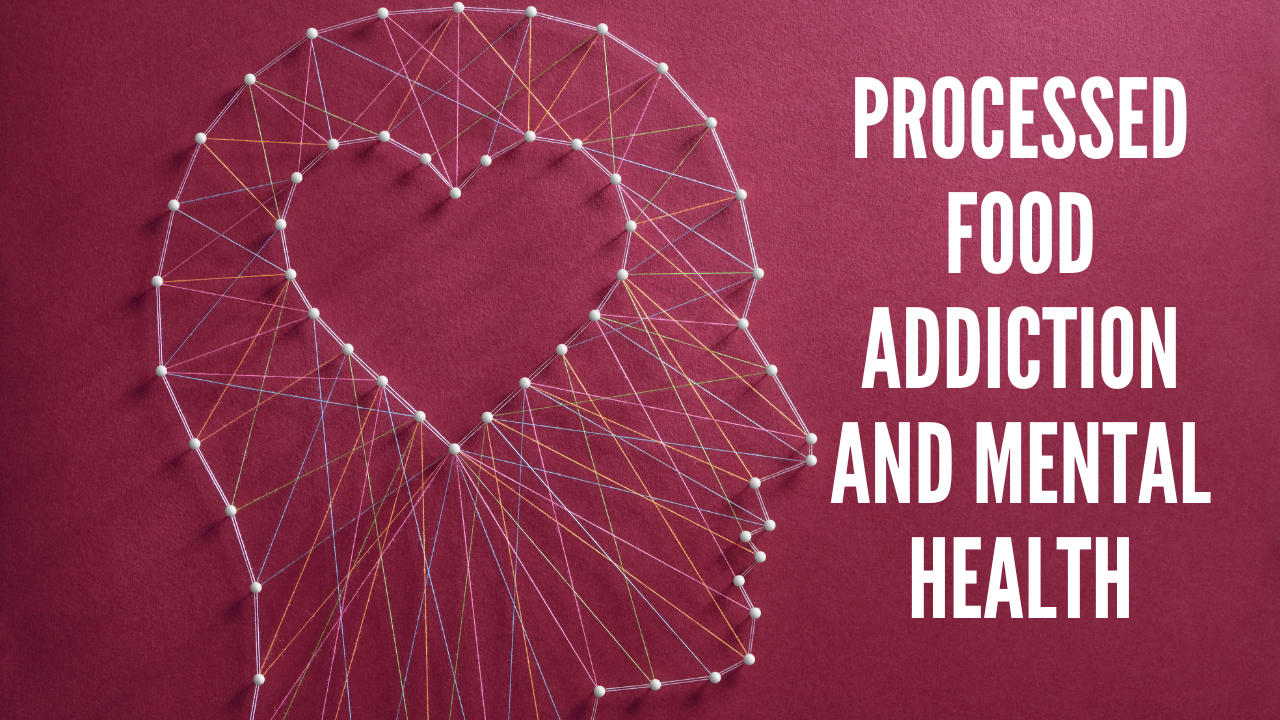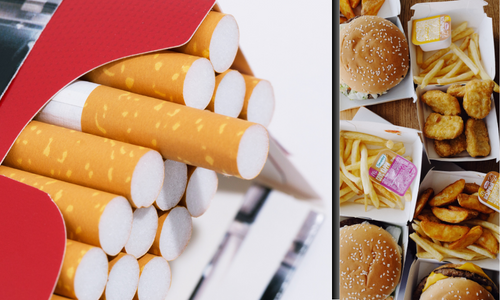Processed Food Addiction And Mental Health | Part 1

Issue No. 44 | Brought to you by the Addiction Reset Community – ARC
Unlocking the secrets of processed food addiction and guiding you to find freedom from food and weight obsession.

Documented records reveal that since the 1980’s the tobacco industry has been taking over the processed food industry. The business model that had successfully driven tobacco addiction has been systematically transferred to the food industry.
The business and marketing tactics of the processed food (formerly tobacco) industry, have resulted in widespread and severe addiction.
Tragically, research reveals that the negative health impacts associated with processed foods include over 100 diseases and illnesses. Amongst them is cognitive impairment, mood alteration and various aspects of mental illness, such as anxiety and depression.
So many people around the world suffer in the painful despair of facing mental health challenges. While some conditions may require specialised clinical diagnosis and treatment, scientific studies reveal that processed food alters brain function and is associated with the following aspects of mental health:
- Anxiety: Processed foods activate brain cells which release a signal that tells the adrenal glands to release adrenalin. With extra adrenalin floating around the body, we become anxious and angry.
- Depression: Processed foods cause reward brain cells to release extra dopamine. So much extra dopamine causes the dopamine pathway to 'wear out.' The technical terms are down-regulate. The pathway can't make the person feel good any more so the person feels depressed.
- Shame: Shame comes from a lack of understanding of the addicted brain. People who don't understand addiction make the addicted person feel like a failure. People who don't understand blame the addicted person for lapsing when it was really triggered by the food industry that caused the lapse. Repeated failure makes the addicted person ashamed even though none of it was their fault.
- Mood Swings: Processed foods are absorbed very quickly into the bloodstream causing glucose levels to rise quickly. This can make the addicted person feel high and even euphoric. However, the pancreas responds to bring down glucose levels by releasing insulin. Insulin can bring down sugar levels very quickly which feels like a crash. People can become very depressed and angry with the sudden drop.
- Dementia: There are a number of reasons that processed foods are associated with dementia and Alzheimer's. Processed foods are inflammatory. They pull blood flow away from the frontal lobe. They dysregulated microorganisms in the gut and promote malnutrition.
- Pain: Processed food is inflammatory. This can put pressure on nerves, especially at the site of an injury. Without the inflammation from processed foods, the injury might not hurt. But with the inflammation, it can become painful. Chronic pain may, in turn, have a negative effect on mental well-being.
- Self-esteem: Processed foods 'downregulate' the parts of the brain that make us feel good. We stop feeling good about anything, including ourselves.
- Racing thoughts: Processed foods increase stress levels and at the same time cravings. Hyperactive stress and craving brain cells release a lot of neurotransmitters which create a lot of thoughts.
- Poor sleep: Many people think that fat tissue on the neck puts pressure on the airways which cause the person to wake up. Another possible explanation for sleep apnea is inflammation caused by processed foods. Food-addicted people may also be fighting daytime grogginess with caffeine which disrupts sleep. Most importantly, processed foods disrupt natural circadian rhythms that regulate sleep. Good quality sleep plays a vital role in mental health.
- Fatigue: Processed foods over-activate the adrenal glands. As these glands wear out, they are unable to continue to energize us. Chronic fatigue may in turn, have a negative effect on mental well-being.
- Despair: Processed foods can completely shut down the parts of the brain that carry messages of what is good in the world. Without these pathways, despair can set in. People also despair because health systems don't know how to treat processed food addiction so people try one weight-loss or eating disorder program after another with no success. This feels like a repeated failure and contributes to despair.

There is hope
The good news is that we can regain control of our thoughts and support our mental well-being when we eliminate the harmful processed foods and retrain the addicted part of the brain.
Connection within a support group that understands the impact of processed foods on mental health and provides a roadmap to manage triggers, cues and cravings, in a kind, compassionate environment is critical for recovery.

Within the Addiction Reset Community (ARC) our members and their journeys are important to us. We find their stories inspiring and hopeful for everybody in health recovery.
"Because the atmosphere is so positive and understanding, people share struggles. I’ve never felt comfortable sharing feelings. Finally, I have the relief of knowing I’m not alone. I’m normal. I’m a victim of food industry exploitation and I know how to protect myself. Sharing my feelings with others has had a remarkable effect on me. Even if I don’t always get direct solutions to my problems, just knowing others care enough to listen to me without judgement, gives me the motivation I need to find my own solutions."

Many people reach out to Joan asking for advice and assistance on how they can begin their recovery journey.
Dear Joan:
I am a 37-year-old single Mum, living with my 12-year-old daughter. I have been trying to eliminate processed food from my diet for the past month or so. I initially tried not buying any processed food at all and I found it pretty easy to stay on track with my food. But then I felt guilty for depriving my daughter and thought should have some snacks available for her sometimes. But I notice that as soon as I bring this into my home, I immediately go back to eating it myself. Why is there this lack of control as soon as I'm around these foods? It’s so frustrating!
Joan responds:
I’m sorry that the lack of control is frustrating for you. Food cues in the house easily stimulate the addicted brain cells to flood the brain with addictive neurotransmitters. These travel to the behavior centers in the brain and control our consumption of processed foods. Getting rid of food cues means that the addicted brain cells are less likely to be triggered to flood the brain and control behavior. Simply put, the absence of food cues will make abstinence from processed food much easier.
Also, understanding cue load and learning skills to manage the triggers and cueing in our environment is a critical part of recovery.
DISCLAIMER:
Dr Joan Ifland (PhD) is a global expert on the subject of processed food addiction and is not a medical doctor. Information and response shared in this Newsletter are not intended for, and should not be construed as medical advice.
Do you have a question? Reach out to us with your questions about food addiction and recovery at gethelp@foodaddictionreset.com
Are you showing signs of Processed Food Addiction? Take this self-quiz to find out now!
Recent copies of Dr Joan Ifland's Blog:
Issue 01 | Issue 02 | Issue 03 | Issue 04 | Issue 05 | Issue 06 | Issue 07 | Issue 08 | Issue 09 | Issue 10 | Issue 11 | Issue 12 | Issue 13 | Issue 14 | Issue 15 | Issue 16 | Issue 17 | Issue 18 | Issue 19 | Issue 20 | Issue 21 | Issue 22 | Issue 23 | Issue 24 | Issue 25 | Issue 26 | Issue 27 | Issue 28 | Issue 29 | Issue 30 | Issue 31 | Issue 32 | Issue 33 | Issue 34 | Issue 35 | Issue 36 | Issue 37 | Issue 38 | Issue 39 | Issue 40 | Issue 41 | Issue 42 | Issue 43


